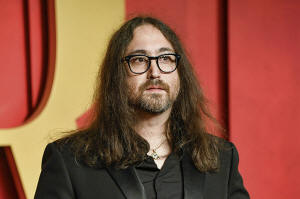Now caretaker of his dad's work, Sean Ono Lennon seeks to innovate, not
merely repeat
 Send a link to a friend
Send a link to a friend
 [December 19, 2024]
By DAVID BAUDER [December 19, 2024]
By DAVID BAUDER
NEW YORK (AP) — Only recently given stewardship over his late father's
work, Sean Ono Lennon is on a remarkable run.
The only child of John Lennon and Yoko Ono won an Academy Award this
year for a short film based on his parents' 1971 song "Happy Christmas
(War is Over")" and, a few months later, was nominated for his
first-ever Grammy, for producing a box set on the album “Mind Games,”
originally released in 1973.
“It feels overwhelming and surreal,” said Lennon, who also recently
shared a Webby Award with his mother for Ono's interactive art project
“Wish Tree.”
For Lennon, who was 5 when the former Beatle was murdered in 1980, the
work is a way to connect with his father. It's more than a preservation
mission: On “Mind Games,” he takes artistic license, pulling apart the
recordings of John Lennon's music to create something entirely new.
Lennon was inspired, in part, by another Beatle offspring, Dhani
Harrison, who helped repackage his own father's “All Things Must Pass.”
Dhani Harrison is also behind this fall's reissue of his dad's “Living
in the Material World,” but that experience is nothing like what Lennon
did with “Mind Games.”
Besides the music, the innovative box is modeled after one of his
mother's art pieces and filled with art reproductions, hidden music,
video, messages and puzzles, some only visible through an ultraviolet
light that is included — “mind games,” remember? The deluxe box retails
for $1,350, but there are less expensive options.

Learning what his father meant to others by hearings fans sing
through the window
Lennon, 49, knew his father was a musician before he died; the boy
tagged along to the studio for some “Double Fantasy” sessions. But truly
understanding his impact came later, like when he'd hear fans singing
his father's music outside their New York apartment on the Oct. 9
birthday they shared. “It was pretty clear to me that wasn't happening
with my friends,” he said.
His father's music played constantly around the house, and learning to
play those songs launched his own journey to become a musician.
“I think I would have rebelled more against my dad's — and my mom's —
music if I had grown up with my dad in the house and I had been angry at
him or rebelled against him,” he told The Associated Press. “Because he
wasn't around, I've always really cherished the music as sort of a
living part of him.”
He inherited the job of keeping his father's music alive for new
generations when his mom, now 91, retired.
In liner notes for “Mind Games,” Lennon explains that “the only
meaningful way that I can show my love to him” is to work hard on his
music and keep it in the culture's consciousness. That's poignant, and
maybe a little sad. Does Lennon really have to prove to anyone that he
loves his father?
“What else can I do in this Earth to express my love and reverence for
my father than to do an incredibly meticulous job of taking care of his
music?” he said. “I can't actually think of anything else, other than
taking care of my mother, which I try to do as well.”
That reverence for his elders came from his mother, he believes. When
his Japanese grandparents came over to the U.S. “it was like the
president was visiting,” he recalled.
Only after he began the “Mind Games” project did Lennon learn that the
album wasn't particularly well-regarded when it was released. He found
an interview where even John Lennon considered it a transition from a
period of political activism to being a musician again. The title song
was its only hit.
That attitude lingers, judging by an online site called “Brutally Honest
Rock Album Reviews.” In an unsigned review, the author said the “Mind
Games” reissue defines overkill. “You can now own and forever cherish
six different versions of songs that were unmemorable at best and a
complete waste of time at worst.”
[to top of second column]
|

Sean Lennon appears at the Vanity Fair Oscar Party in Beverly Hills,
Calif., on March 10, 2024. (Photo by Evan Agostini/Invision/AP,
File)
 Motivated to make people take a
second look at “Mind Games”
That only motivated Lennon to work harder, and led to a bold
artistic decision. Part of the reason the album didn't really
connect was because it wasn't promoted well or supported by
concerts, he said. But he also described the original album mix as
thin and not doing justice to the music.
Using the original recordings, he constructed new versions of the
songs, sometimes emphasizing different instruments. He sought a
warmer, more direct sound reminiscent of Lennon's “Plastic Ono Band”
album — most visibly on “Aisumasen (I'm Sorry),” one of a handful of
compositions reflecting marital turmoil that presaged Lennon's
notorious “lost weekend” separation from Ono.
Different versions of the title cut also show Sean's approach.
There's the original “Mind Games,” with a distinctive chiming sound
that drives the melody. That's stripped away in a new mix where a
reggae guitar lick becomes audible. An organ-dominated instrumental
sounds like a church hymn. There are other outtakes, some with
alternate lyrics and one with a snippet of “Make Love, Not War,” a
song fragment dating back to the Beatles that the author repurposed.
He didn't have a trove of unheard material to mine, other than
Lennon's demo of “I'm the Greatest,” a song he gave to Beatle mate
Ringo Starr.
In some of the new versions, Sean goes beyond remixing or revealing
outtakes to imposing his own artistic vision over his father's.
“There are some people who feel that it's taking liberties, and I
guess it technically is,” Lennon said. “The way I look at it is, if
I'm going to do the best job I can, the only way I can do that is to
follow my heart and make it sound the best that it can sound. If
that means maybe turning down an instrument a lot in a certain
section because I don't think it's helping, then I'm going to do
that.”
For anyone who wants the original versions, they're readily
available.
“It's very forensic work,” he said. “I'm not worried about what
someone else is going to think. I'm just in there trying to do good
by my dad, and I really feel that I know how to do good by him,
because I know his music better than I know anybody else's music.”

His father's human moments that inspired his son as a musician
As a musician, he relates to moments where his father expresses
vulnerability, like an interview where John described “Intuition” as
a good song where he didn't nail the lyrics. The “Get Back” film of
recording sessions for the “Let it Be” album showed the Beatles as
humans who didn't hand songs down from Mount Olympus.
Next on the docket is a film resurrection of the “One to One”
concerts involving his father and a reissue of the “Walls and
Bridges” album. Sean, who lives and works in New York and is
involved in a longtime relationship with musician and model Kemp
Muhl, released his own album, “Asterisms,” this year.
Told he sounded like his father when singing forcefully, Lennon
practically whispered lyrics on his early albums. He hated the way
he sounded, but didn't want to deal with the comparisons. He doesn't
hold back anymore. “Now I'm too old to care,” he said.
“I didn't get into music because I had some great talent or
something,” he said. “I got into it because my dad was this famous
musician and playing his songs and learning his music made me feel
closer to him.”
All contents © copyright 2024 Associated Press. All rights reserved |